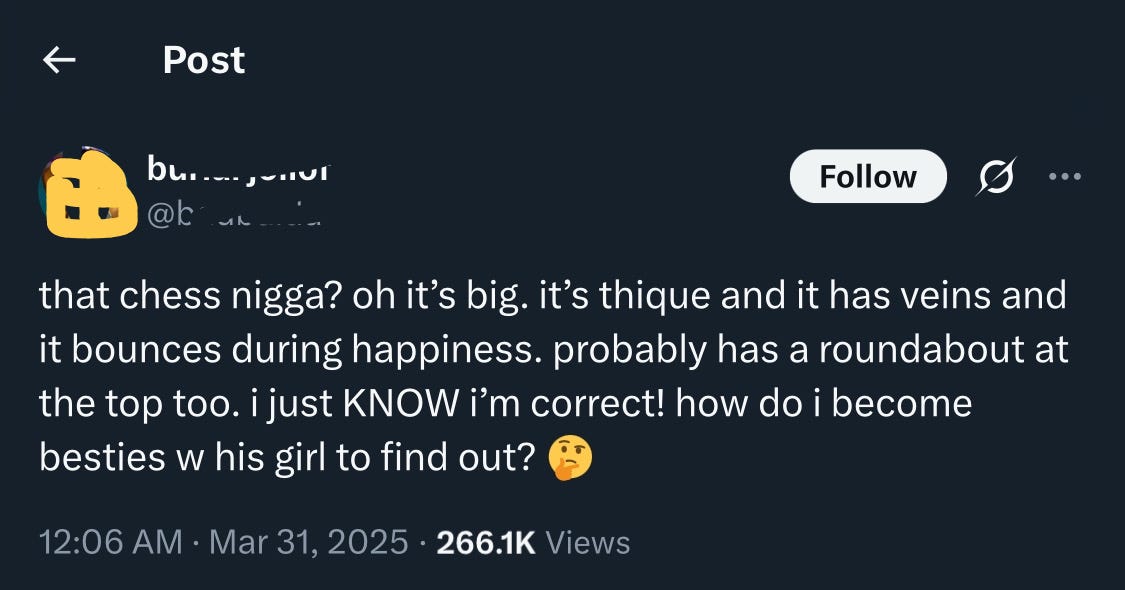What word did you fill the gap with? Go ahead, tell me in the comments. I suspect it isn’t good, which is okay because then we are on the same page.
I didn’t want to be the one to spell it out, and then you people would act like it’s only me who thinks so. But normally, I wouldn’t feel the need to write about this topic because it’s almost like saying, “Water is wet.” However, an “experiment” I recently conducted frustrated me to the point of writing a full essay where I share some points you may not have already considered.
The results of my experiment made me concerned about how much we seem to dislike complex thought. Of course, there are exceptions, and a person reading Connecting is likely one of them.
For reasons I will discuss, Nigerians do not like to think. We also demonstrate an aversion to new information, preferring to stick with childhood indoctrination no matter how it harms us or others. And while we want to believe we value honesty, integrity, and hard work, real life shows this is far from the truth.
Our disdain for deep thinking makes us powerless against an oppressive government. It is also why we have a convoluted, corrupt civil service filled with representatives of our tyrannical selves.
I do not believe these are manifestations of an innate trait. Bio-essentialism is lazy and dooms us to the status quo. This way of explaining does not consider the environmental factors that influence human behavior and social dynamics. It’s also often proven wrong as our scientific study improves. For example, bio-essentialism said women were not equipped for the rigors of formal education. It also said women have no/low sex drives while mutilating our genitalia and socializing us to feel shame and guilt for wanting/having sex.
In the case of the subject at hand, the collective tyranny of Nigerian society, I think is a consequence of being raised in homes with strict hierarchies, where any rebellion or even authentic expression that strayed outside established confines was met with violence. Not only were parents oppressive, but older siblings attained god status and were free to mete out unfitting punishments for alleged crimes.
We witnessed authority figures abuse power without repercussions and learned that we, too, can abuse power when given the chance. These formative exposures taught us to be good, not because it is valuable in itself but in order to avoid punishment. It told us that if we can get away with wrongdoing, there’s no point in being a decent human being.
The Nigerian upbringing also explains our collective cowardice. Children were never allowed to question unfair treatment or even get upset about it. Any attempts to do so incurred wrath. Nigerian children chose, instead, to just hope and wait for a day that we get to be on top. Think: bullied junior secondary students in a boarding house, not wanting to break the cycle but anticipating the pain they would inflict when they finally became seniors.
But to fully explain the ills of our society, let's return to…
The bold and brazen Nigerian anti-intellectualism.
Is it not ironic that a country that emphasizes education is simultaneously populated by people who detest learning?
No, actually, not exactly.
Nigerian society does not really prioritize education. We do not value learning, critical thinking, and avenues for mental expansion. We only pursue certificates because, as they say, “A degree is the surest path to success. " And success here is defined largely by finance.
To be fair, the Nigerian school system does not even educate. It teaches people how to cower to authority, think in black and white, and memorize. Maybe you went to a woke school but my teachers beat me with reckless abandon. Canning little boys up to twenty times on their buttocks. I even have a scar on my wrist for being unable to say the date in Efik. Meanwhile, when it came to teaching, a subject like mathematics, especially at the secondary school level, was devoid of reasoning, and we were fed only formulas.
Tertiary institutions are no better. Lecturers are out to frustrate you, and most Nigerian students do not care for their programs. They just want to clock in and leave with their degrees. Which is understandable if you went in for a course you didn’t choose.
But what is worse is that most students do not apply what they are taught to real life because they see lessons only as abstractions. It’s no surprise my 4th-year, medical student classmates, who had done anatomy, still believed that a girl/woman’s wide gait was the consequence of having sex with many men.
The “Experiment”
If you saw my last entry and read it to the end, you would have noticed a link for readers to anonymously leave philosophical/interesting questions. I think you should check out the post to see how the invitation was phrased.
I also shared the link on social media with a similar caption.
My intention was for an interactive session like the Valentine’s entry on post-modern romance. But this time, I got an influx of an obsession that the Nigerian mind cannot shake off—Sex/romance. Especially of other people.
I wondered if these kind of responses could be ascribed to the connotations of an anonymous link but the Google form for the Valentine’s entry was anonymous too. Perhaps the difference in what I received was because this time I was more open. With the Google forms, I had asked respondents specific questions.
What’s even funnier is that after drafting the above paragraph, I opened X and this was the first post I saw:
I bet you didn’t expect this essay (or is it rant?) to take this direction. But the messages I got made wonder if we generally do not care to think about and discuss more sophisticated things.
Almost all the messages were like this:
I’m not saying that caring about romance and such is inherently bad. Heck, I’m a romantic. But there’s this childish glee we get when it comes to other people’s sex/romantic lives that begs explanation. Why is this subject so “interesting” that these are the questions I receive given the prompt I left?
But of course, this is not a real experiment and like three people asked me other kinds of questions.
These kind of perverse interests and laziness in thought shows up in various ways. Like in this recent X post where 29,000 people thought it was funny to beat up a person for being gay. Same people that will never lift their finger at politicians who systematically hurt and kill us. Nigerians would instead aspire to be in the same position so they can further plunder our common wealth.
Even tribalism, a generally reproached version of our deep-rooted hate for “the other” is just a veneer for our general fascism (more on this in the future). We live in a deeply conformist society that stifles thought, innovation, and progressive change. We can’t think past our direct needs/wants and immediate futures.
April 1st was Nigerian Police Force Day, and I saw that sepia photo I used at the start of this rant. It’s a line up of Nigerian police men. The picture reminded me of Chinua Achebe’s Things Fall Apart, specifically the “Kotma of the ashy buttocks,” which encapsulates a lot of our problems.
I think we can do better. We can break the vicious (mental) poverty and (financial) poverty cycle. It’s not completely our fault but it’s our responsibilty and there’s no one coming save us. We can see beyond money, sex, and deity. Have more varied and expansive interests. Be curious about abstract ideas and be excited just to learn.
Author’s Note
I’d still like to try and have that interactive entry next or upper week. Please leave your interesting questions here. I look forward to answering them.
I hope I wasn’t too scathing?
My new favorite song is this South African Bubblegum pop record, Peacock by Splash.
Remember to share this with someone else. In case you haven’t noticed I’m writing more. Give me a heart so I know someone cares.
Till next time on Connecting with Kuffy Eyo.













Awesome read. I think about these things a lot and having someone has eloquent as you pen them down is so fulfilling
Lovely stuff K!